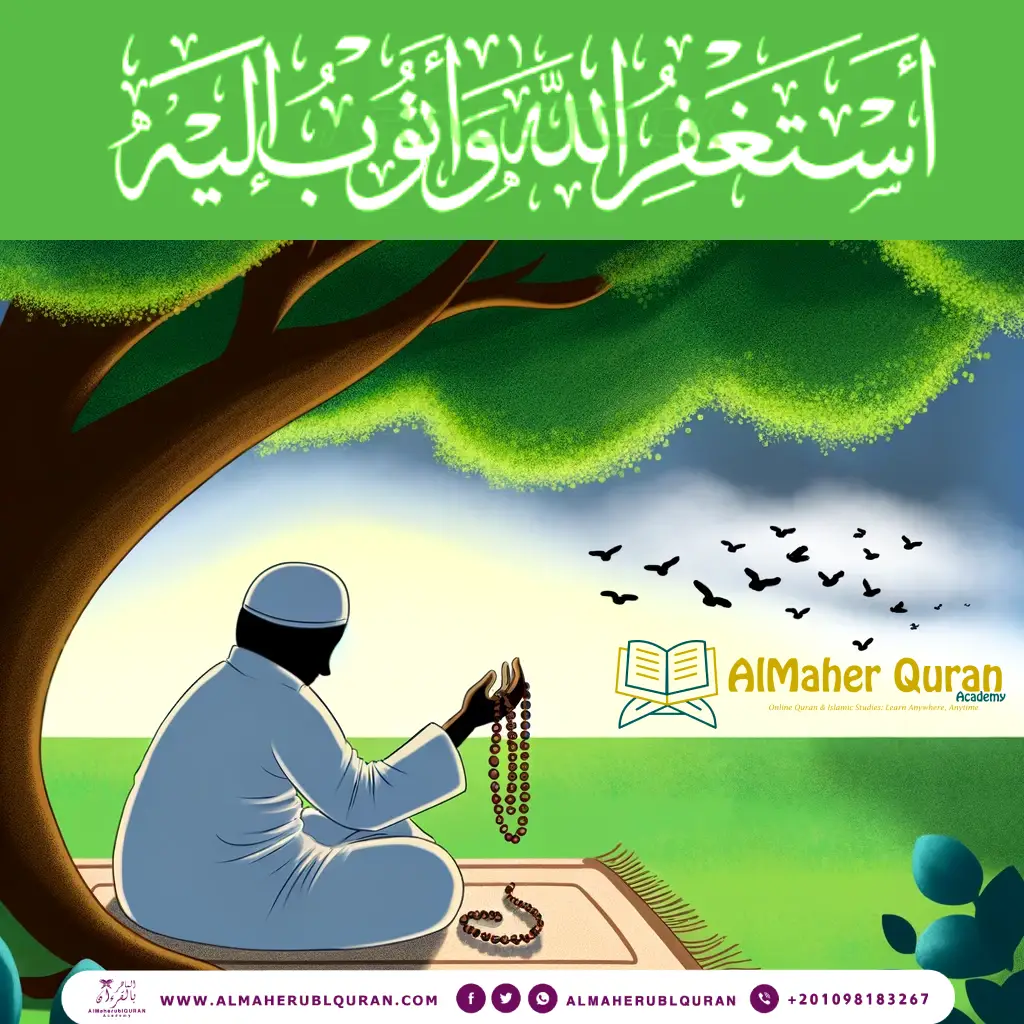Istighfar, linguistically, is derived from the verb “to seek forgiveness” and means asking for pardon and forgiveness from Allah, the Almighty. In technical terms, it carries the same meaning, where the servant intentionally seeks Allah’s forgiveness, pardon, support, and assistance.

The Importance of astaghfirullah
Astaghfirullah is considered one of the best and greatest forms of remembrance (dhikr), and Allah encourages His servants to practice it in the Quran, as He says: “So glorify the praises of your Lord and ask for His forgiveness. Indeed, He is ever to repent” (translation of the meaning).
فَسَبِّحْ بِحَمْدِ رَبِّكَ وَاسْتَغْفِرْهُ ۚ إِنَّهُ كَانَ تَوَّابًا
Frequency of astaghfirullah
The Prophet Muhammad (peace be upon him) is reported to have sought Istighfar 100 times a day, and encouraged the recitation of certain supplications three times. This indicates the importance of frequent istighfar, not limited by a specific number, allowing Muslims to seek forgiveness anytime.
Times for astaghfirullah
A Muslim should seek Allah’s forgiveness at all times, especially after committing sins, performing good deeds, and during specific times like the last third of the night, during prostration, and after obligatory prayers, as these are considered the best times for istighfar.
Formulations of Istighfar
Several formulations of istighfar are mentioned in the Quran and the prophetic traditions, including:
- “My Lord, indeed I have wronged myself, so forgive me” (Quran).
- “Our Lord, forgive us our sins and our transgressions in our affair, and make firm our steps and help us against the disbelieving people” (Quran).
- The Prophet’s supplication: “I ask forgiveness of Allah astaghfirullah, the Mighty, and I repent to Him.”
The Etiquettes of Istighfar
When istighfar, a Muslim should observe certain etiquettes, including sincerity to Allah, feeling humbled and recognizing the sin, making supplication in secret, persistence in istighfar, beginning with praising Allah, istighfar at times of acceptance, using the formulations mentioned in the Sharia, and including all believing men and women in the supplication for forgiveness.
Astaghfirullah - وَاسْتَغْفِرُوا اللَّهَ
In the Arabic language, the letters alif, sin, and ta’ (است) are added to verbs to indicate a request. Thus, saying “أستغفر الله” astaghfirullah means requesting forgiveness from Allah, the Almighty, the Most Glorious.
istighfar can be expressed in various phrases, including the most beautiful and best forms, which involve appealing to the Forgiving and Merciful King by His names and attributes. It also implicitly includes a request for concealment by Allah, the Most Glorious, and salvation from His punishment.
The statement “أتوب إليه” acknowledges all sins and wrongdoings committed by the servant. It also acknowledges shortcomings in obedience, regret for them, and a determination not to repeat these sins or shortcomings.
Astaghfirullah Etiquettes
There are specific etiquettes to observe when istighfar, the most important of which is sincerity towards Allah, the Almighty. A servant should not say “أستغفر الله وأتوب إليه” while their heart is heedless of what they are saying.
Among the etiquettes of Istighfar is that the person should be in a state of purity, which is recommended though not obligatory, but has a significant effect on the heart’s humility.
Persistency in astaghfirullah is also an etiquette; one should not just say “أستغفر الله وأتوب إليه” once but should repeat it, as Allah, the Almighty, loves those who persistently seek forgiveness.
Feeling humbled and submissive to Allah, the Almighty, is part of the etiquettes, acknowledging that no one except Him can forgive sins and accept repentance.
Formulations of astaghfirullah in Quran
Allah, the Almighty, has mentioned seeking forgiveness in His book in many places, including commands such as “وَاسْتَغْفِرُوا اللَّهَ إِنَّ اللَّهَ غَفُورٌ رَّحِيمٌ” (البقرة 199), and “وَأَنِ اسْتَغْفِرُوا رَبَّكُمْ ثُمَّ تُوبُوا إِليه” (هود 3). Seeking forgiveness is also mentioned in praise of those who do so, describing the believers and the pious as “وَالْمُسْتَغْفِرِينَ بِالأَسْحَارِ” (آل عمران 17) and “وَبِالأَسْحَارِ هُمْ يَسْتَغْفِرُونَ” (الذاريات 18). These verses highlight the virtue of seeking forgiveness at a specific time, which is before dawn.
Seeking forgiveness is also described as a characteristic of the righteous, as in “وَسارِعُوا إِلى مَغْفِرَةٍ مِنْ رَبِّكُمْ وَجَنَّةٍ عَرْضُهَا السَّماواتُ وَالْأَرْضُ أُعِدَّتْ لِلْمُتَّقِينَ” (آل عمران 133), followed by “وَالَّذِينَ إِذَا فَعَلُواْ فَاحِشَةً أَوْ ظَلَمُواْ أَنْفُسَهُمْ ذَكَرُواْ اللَّهَ فَاسْتَغْفَرُواْ لِذُنُوبِهِمْ وَمَن يَغْفِرُ الذُّنُوبَ إِلاَّ اللَّهُ وَلَمْ يصِرُّواْ عَلَى مَا فَعَلُواْ وَهُمْ يَعْلَمُونَ” (آل عمران 135).
Allah also promises forgiveness to those who seek it, saying, “وَمَن يَعْمَلْ سُوءًا أَوْ يَظْلِمْ نَفْسَهُ ثُمَّ يَسْتَغْفِرِ اللَّهَ يَجِدِ اللَّهَ غَفُورًا رَّحِيمًا” (النساء 110).
Astaghfirullah is mentioned as a means to attract goodness and blessings and to ward off calamity. For example, Allah tells His prophet Noah, “فَقُلْتُ اسْتَغْفِرُوا رَبَّكُمْ إِنَّهُ كَانَ غَفَّارًا * يُرْسِلِ السَّمَاءَ عَلَيْكُم مِّدْرَارًا * وَيُمْدِدْكُم بِأَمْوَالٍ وَبَنِينَ وَيَجْعَل لَّكُمْ جَنَّاتٍ وَيَجْعَل لَّكُمْ أَنْهَارًا” (نوح 10-12).
Seeking forgiveness is also presented as a condition for receiving mercy and avoiding Allah’s punishment, as in “وَمَا كَانَ اللَّهُ مُعَذِّبَهُمْ وَهُمْ يَسْتَغْفِرُونَ” (الأنفال 33).
The benefits and effects of Istighfar:
Gaining closeness to Allah, the Almighty, and increasing attachment to Him, as the more a Muslim engages in the remembrance of Allah, the closer they become to Him.
Alleviating distress and expanding the chest, removing worries and sorrows.
Serving as a reason for entering the gardens of bliss and enjoying what Allah, the Almighty, has prepared for its inhabitants.
Purifying and cleansing the heart, bringing about a feeling of comfort and tranquility.
Acting as an expiation for sins; frequent and continuous seeking of forgiveness is among the reasons for the forgiveness of minor sins and major sins, provided the conditions of repentance are also met. However, scholars have differing opinions on this matter as follows:
The first opinion (Shafi’i): They believe that if the intention behind seeking forgiveness is humility and need without repentance, it expiates minor sins, not major ones.
The second opinion (Maliki, Hanafi, and Hanbali): They believe that seeking forgiveness, even without repentance, expiates all sins, including major and minor sins.
Serving as a means to avert calamities that may befall a servant, and as a way to solve problems faced and overcome difficulties in life.
Being a form of supplication, where a Muslim asks their Lord for forgiveness of sins, and the more this is accompanied by feelings of humility and need before Allah, the Almighty, the more hopeful one can be for the supplication to be answered, especially if seeking moments and times of acceptance.
Methods of Counting Dhikr with the Hand
Counting with the Fingers: Mulla Ali Qari interpreted the saying of the Prophet – peace and blessings be upon him – “count them on your fingers” to mean using the fingers as a part represents the whole. Al-Manawi stated, “This is clear in counting on each finger individually, not as many are accustomed to counting by folding the fingers.”
Counting with the Finger Tips: The fingertips refer to the tips of the fingers. Ibn Allan suggested that the counting could be done with the fingertips themselves, which Ibn Hajar mentioned as being the closest interpretation. This method is similar to counting with the fingers but involves using the tips of the fingers by placing the thumb on each tip.
Counting with the Joints: Counting with the finger joints is a well-known practice today. Each finger has three joints, and counting is done by placing the thumb on a joint for each mention, allowing for an increase in the number as desired to reach a specific count.
Is Tasbeeh with the Right or Left Hand?
The Sunnah is to perform tasbeeh the legislated adhkar with the right hand. In a narration of the hadith by Abdullah ibn Amro – may Allah be pleased with them – he said, “I saw the Messenger of Allah – peace be upon him – making tasbeeh,” Ibn Qudamah mentioned, “with his right hand.” Scholars today have differing opinions:
Sheikh Al-Albani – may Allah have mercy on him – stated that the Sunnah is to make tasbih with the right hand and not to do so with the left.
Sheikh Bakr Abu Zaid – may Allah have mercy on him – stated that the Sunnah is to make tasbih with both hands, and not to restrict tasbih to the right hand only.
The Permanent Committee of Scholars stated that it is preferable to make tasbih with the right hand, but it is permissible to do so with the left as well.
Using the right hand is deemed better and more complete, as the Prophet – peace be upon him – loved to use his right hand in his purification, combing his hair, and wearing his shoes. The Permanent Committee of Scholars issued a fatwa stating, “The matter is broad, and there is no harm in using the fingers of both hands as is apparent from the hadith of Yusra previously mentioned, but using the fingers of the right hand is better.
Counting with a Tasbeeh (Rosary): Sheikh Ibn Uthaymeen – may Allah have mercy on him – was asked about counting tasbeeh with a rosary and whether it is an innovation. He replied that making tasbeeh with a rosary is not an innovation, and there is no harm in it, as it has a basis from some companions who used pebbles for counting.
